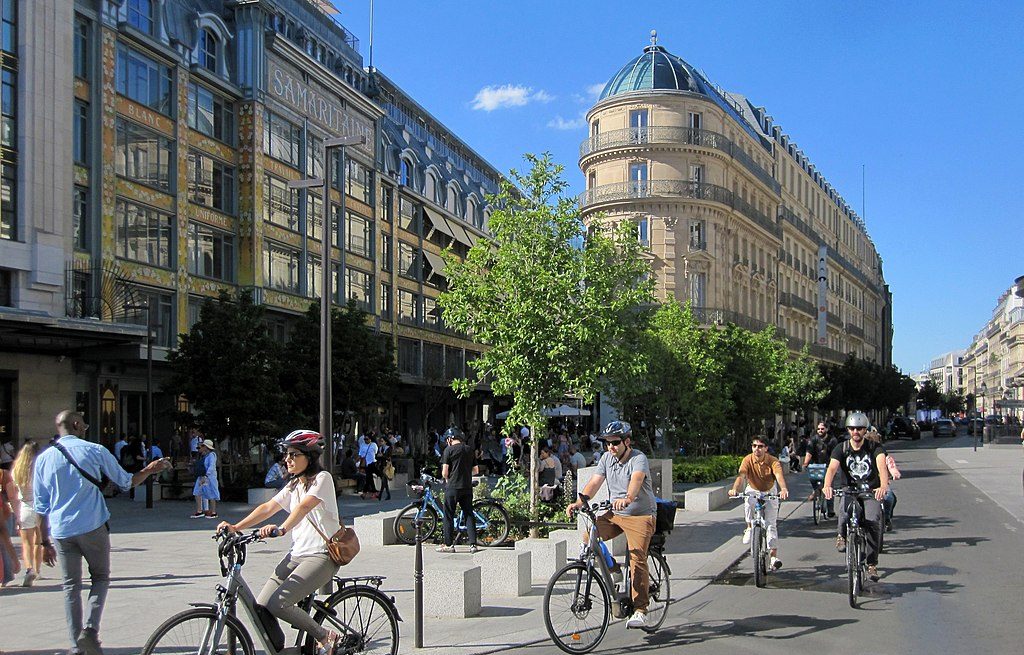- Fifteen-minute cities encourage walking by making it convenient (Kansas City Star). But getting people out of their cars will take more than providing needed amenities within a 15-minute walk. Most of those who can afford to drive will still drive unless safe infrastructure is also in place (State Smart Transportation Initiative).
- Commuter rail in general is facing higher operating costs and lower fare revenue post-pandemic, but a U.S. Government Accounting Office report found that 19 of 31 systems are near or above pre-2020 levels, while 12 remain significantly lower. (Transportation Today)
- With the Infrastructure Investment and Jobs Act set to expire, the National League of Cities is urging mayors to express their priorities for the next surface transportation bill to Congress. (Governing)
- Battery-powered freight trucks are already competitive with internal combustion trucks. Now all that's needed is charging depots. (Transport Environment)
- Transportation for America used an all-time great Dril tweet to illustrate that the federal government spends way too much money on roads, and the American Association of State Highway and Transportation officials (AASHTO) is lobbying for even more.
- Tech billionaires may have found a way around the need for voter approval to build a new city from scratch in Northern California. (Fast Company)
- The price tag for the Rose Quarter freeway project in Portland has more than doubled to $2 billion. (Oregonian)
- Getting released from Santa Fe's jail can sometimes mean a death sentence, as former inmates are forced to walk miles along dangerous roads if no one is there to pick them up. (New York Times)
- A Texas bill that started off as a cynical way to enshrine fetal personhood into law might wind up letting the vast majority of women drive in HOV lanes alone. (Texas Tribune)
- SEPTA transit workers rallied outside the Pennsylvania Capitol demanding state funding to prevent steep service cuts. (NBC Philadelphia)
- Lyft is threatening to leave Colorado unless Gov. Jared Polis vetoes a rideshare safety bill. (KDVR)
- Washington Gov. Bob Ferguson signed bills putting transit users on public transportation boards (Disability Rights) and allowing judges to put speed limiting devices on reckless drivers' vehicles (Fast Company).
- Michigan bike and road safety advocates are pushing for new laws to protect vulnerable roadway users. (WOOD)
- Opposition to a streetcar project helped propel Democrat John Ewing Jr. to victory over incumbent Republican Jean Stothert in the Omaha mayor's race. (Nebraska Examiner)
Today's Headlines
Thursday’s Headlines Want Five-Minute Cities, Maybe?
A 15 minute city doesn't mean people never drive short distances, a new poll finds — but it does mean residents at least have the *option* to walk instead, and that can carry enormous benefits.

Paris is a successful 15-minute city, but proximity to destinations doesn’t mean much without safe routes to get their on foot or by bike.
|Photo: DiscoA340Stay in touch
Sign up for our free newsletter
More from Streetsblog USA
Tuesday’s Headlines Went the Wrong Way
Multi-lane one-way streets: bad. Single-lane two-way streets: good.
What It Would Take to Map Every Sidewalk In Your State
States and tech companies keep detailed records of virtually every driving lane in America — but not every sidewalk. Until now.
New Calif. Legislation, Backed by Bike Safety Groups, Proposed to Regulate E-Motos/E-Bikes
Electric bicycles are transforming how Californians get around, but the rapid rise of high-powered electric devices has created confusion that puts people at risk,” said Marc T. Vukcevich, Director of State Policy for Streets For All.
The Wonders of Biking in Taiwan
One of San Francisco's most notable urbanists explores Taipei's night markets and bike infrastructure. He wonders: can San Francisco adopt their biking culture?
Why Is the Governor of New York Trying to Make It Easier to Deny Traffic Violence Victims Insurance Payouts?
The governor is still fighting to make it cheaper to drive with a reform that would reduce compensation to some crash victims.
Study: Most Of America’s Paint-Only Bike Paths Are On Our Deadliest Roads
Even worse, most Americans see these terrible lanes and think, "I'd be crazy to ride a bike" — and the cycle continues.





